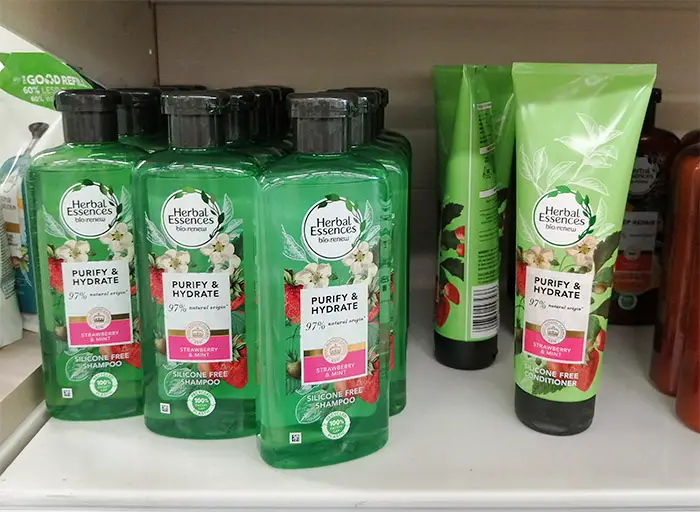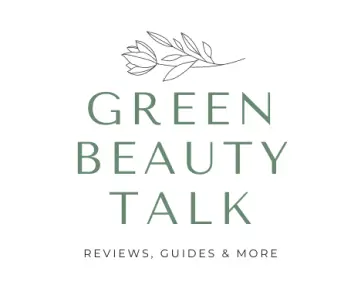
Herbal Essences shampoos are hard to miss with their vibrant, flower-adorned bottles promising a botanical experience. They market themselves as a natural and beneficial hair care option. But the big question is: “Are Herbal Essences shampoos really as good for your hair as they seem?”
In this post, we’ll dive into the ingredients, benefits, and potential drawbacks of using Herbal Essences shampoos to help you decide if they’re the right choice for your hair.
Quick Answer:
Herbal Essences shampoos can be a mixed bag. They offer sulfate-free and silicone-free options, which can be great for sensitive scalps and avoiding build-up. Plus, they have formulas that are 97% natural. However, some shampoos contain ingredients that might cause irritation or dryness, so it’s important to choose the right product for your hair type and needs.
Table of Contents
- What Exactly Is in Herbal Essences Shampoos? Ingredients Analyzed
- Does Herbal Essences Cause Hair Loss?
- Pros and Cons of Using Herbal Essences
- What About the Lawsuits?
- Final Thoughts
- FAQs
What Exactly Is in Herbal Essences Shampoos? Ingredients Analyzed
When it comes to Herbal Essences shampoos, the ingredient list can be complex. Here’s a closer look at what you might find inside those eye-catching bottles.
Surfactants
- Examples: Sodium Lauryl Sulfate, Lauramidopropyl Betaine, Sodium Xylenesulfonate
- Purpose: Loosen dirt and oil particles from your hair and scalp
- Potential Side Effects: Can be drying and might cause irritation, especially for sensitive scalps
Antistatic Agents
- Examples: Polyquaternium-10, Polyquaternium-6
- Purpose: Reduce static, keeping your hair from flying away
- Potential Side Effects: Generally safe, but always a good idea to patch-test any new product
Conditioning Agents
- Examples: Trihydroxystearin, Guar Hydroxypropyltrimonium
- Purpose: Soften and smoothen hair texture
- Potential Side Effects: Generally considered safe
Silicones
- Examples: Dimethicone, Dimethiconol (more lightweight but can still build up)
- Purpose: Add shine and smoothness to hair
- Potential Side Effects: Can cause build-up over time, requiring the use of clarifying shampoos
Botanical Extracts
- Examples: Argan Oil, Coconut Oil, Aloe Vera Juice, Sea Kelp Extract, Passionflower Extract
- Purpose: Nourish, soothe, and condition the hair and scalp
- Potential Side Effects: Mostly safe, but some individuals might have allergies to specific botanicals
Preservatives
- Examples: Sodium Benzoate, Methylchloroisothiazolinone, Methylisothiazolinone, Sodium Salicylate
- Purpose: Prevent bacterial growth in products
- Potential Side Effects: Some can cause allergic reactions or irritations. Methylchloroisothiazolinone and Methylisothiazolinone are known to cause contact dermatitis in some individuals.
Propylene Glycol
- Purpose: Moisturizes and softens the hair
- Potential Side Effects: Can cause skin irritation and allergic reactions in some people. Named the American Contact Dermatitis Society’s Allergen of the Year in 2018.
Fragrances – Synthetic & Natural
- Examples: Hexyl Cinnamal, Limonene, Linalool, Coumarin
- Purpose: Provide a pleasant scent to the product
- Potential Side Effects: Known allergens; can cause skin irritations in some individuals
Herbal Essences also offers products that are 97% natural such as Aloe Moisturise Shampoo (silicone-free, sulfate-free), featuring more plant-based ingredients. However, even natural ingredients can sometimes cause reactions, so it’s important to choose the right product for your hair type and be mindful of any sensitivities you might have.
Does Herbal Essences Cause Hair Loss?
While Herbal Essences shampoos do not directly cause hair loss, some of the ingredients they contain can lead to irritation or allergic reactions in certain individuals. This can, in turn, contribute to hair issues such as breakage, thinning, or shedding.
Potential Irritants:
- Sulfates: Ingredients like Sodium Lauryl Sulfate can strip natural oils from your hair and scalp, leading to dryness and irritation, especially for sensitive scalps.
- Preservatives: Preservatives such as Methylchloroisothiazolinone and Methylisothiazolinone can cause allergic reactions or contact dermatitis, leading to inflammation and potential hair weakening.
Silicones and Build-Up:
Dimethicone and Dimethiconol add shine and smoothness but can cause build-up on your scalp, which might clog hair follicles and hinder hair growth.
Allergic Reactions:
Synthetic fragrances and certain botanical extracts can trigger allergic reactions, causing itching and redness. Persistent irritation can damage hair follicles and lead to hair loss.
To minimize these risks, choose a formula that suits your hair type and be mindful of any sensitivities you might have. If you experience persistent irritation or hair loss, it may be helpful to consult a dermatologist or hair care professional.
Pros and Cons of Using Herbal Essences
Choosing the right shampoo can be a bit of a balancing act. Here’s a quick rundown of the pros and cons of using Herbal Essences shampoos.
Pros:
- Wide Range of Products: Herbal Essences offers a variety of shampoos catering to different hair types and concerns. Whether you need hydration, volume, or color protection, there’s likely a product for you.
- Sulfate-Free and Silicone-Free Options: For those with sensitive scalps or who prefer to avoid certain chemicals, Herbal Essences provides sulfate-free and silicone-free options.
- Natural Ingredients: Some formulas boast a high percentage of natural ingredients, with some products even claiming to be 97% natural.
Cons:
- Irritating Ingredients: Some formulas contain ingredients that can be potentially irritating. This includes certain preservatives and surfactants that might not suit everyone.
- Silicone Build-Up: While silicones like Dimethicone and Dimethiconol add shine and smoothness, they can also build up over time. This might require the occasional use of a clarifying shampoo to keep your hair from feeling weighed down.
- Synthetic Fragrances: The lovely scents in Herbal Essences shampoos come from synthetic fragrances, which can cause skin reactions in some individuals.
Overall, Herbal Essences conditioners can be good for your hair if you choose the right formula for your hair type and are mindful of potential build-up and sensitivities.
What About the Lawsuits?
Herbal Essences has faced some legal issues over the years. For instance, their Bio Vanilla Honey & Vitamin B Shampoo was under scrutiny for not living up to its “natural” claims. There were also concerns about the endorsement from the Royal Botanical Gardens, Kew.
Despite these bumps, Herbal Essences remains popular. However, this just shows that beauty products are not always what they seem, and brands can be misleading consumers, so it’s important to do your own research.
Final Thoughts
Herbal Essences shampoos and conditioners do contain natural ingredients and extracts, and in some ways, they are better than other conventional brands. They even offer 97% natural shampoos, so it’s not all bad. They provide benefits like added moisture, reduced frizz, and enhanced shine.
However, it’s important to be aware of the ingredients and potential concerns, such as silicones, preservatives, and synthetic fragrances, which might not work well for everyone.
When choosing a product, consider your hair type and any sensitivities you might have. If you’re prone to build-up, look for their sulfate-free and silicone-free options. Also, remember to read labels and do a patch test with any new product to avoid unwanted reactions.
And finally, stay informed. Just because a product looks and smells great doesn’t always mean it’s the best for your hair. Doing your own research and understanding what you’re putting on your hair can make a big difference in your hair care routine.
FAQs
Does Herbal Essences have DMDM hydantoin?
Certain Herbal Essences products, like their Totally Twisted Curl Boosting Hair Mousse, contain DMDM hydantoin, a preservative known to release formaldehyde, which has been linked to cancer concerns. While many of their shampoos have had this ingredient removed, it’s best to check the label to be sure. If you prefer to avoid DMDM hydantoin, always review the ingredient list before purchasing
Can Herbal Essences shampoo cause dandruff?
Herbal Essences shampoos are not specifically formulated to cause dandruff. However, if you have a sensitive scalp or are prone to dandruff, ingredients like sulfates and synthetic fragrances in some of their products could potentially cause irritation and lead to dandruff.
Is Herbal Essences suitable for color-treated hair?
Yes, Herbal Essences offers shampoos and conditioners that are specifically designed for color-treated hair. Look for products that are sulfate-free and labeled as color-safe to help maintain your hair color.
Are Herbal Essences products cruelty-free?
Herbal Essences is recognized as a cruelty-free brand by PETA. They do not test their products on animals and are committed to ensuring their products meet cruelty-free standards.
Do Herbal Essences products contain parabens?
Many Herbal Essences products are free of parabens, but it’s always best to check the specific product label to be sure. Parabens are preservatives that some people prefer to avoid due to concerns about their potential health effects.

Petra Nakashian (previously Kravos) is a dedicated natural health and beauty blogger, driven by the loss of her parents to cancer, which led her to meticulously research beauty product ingredients. With over 10 years of experience, her in-depth knowledge has made her a trusted expert in the field. Founder of Be Healthy Now and Green Beauty Talk, Petra recently expanded her expertise with Beauty Insights Hub, exploring a wider range of beauty treatments. Committed to transparency and honesty, her work is a vital resource for navigating the complex world of beauty.

